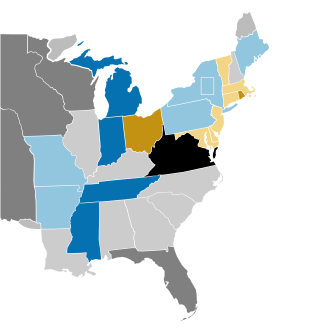
The 1844–45 United States Senate elections were held on various dates in various states, coinciding with James K. Polk's election. As these U.S. Senate elections were prior to the ratification of the Seventeenth Amendment in 1913, senators were chosen by state legislatures. Senators were elected over a wide range of time throughout 1844 and 1845, and a seat may have been filled months late or remained vacant due to legislative deadlock. In these elections, terms were up for the senators in Class 1.

The 1840–41 United States Senate elections were held on various dates in various states. As these U.S. Senate elections were prior to the ratification of the Seventeenth Amendment in 1913, senators were chosen by state legislatures. Senators were elected over a wide range of time throughout 1840 and 1841, and a seat may have been filled months late or remained vacant due to legislative deadlock. In these elections, terms were up for the senators in Class 2.

The 1860–61 United States Senate elections were held on various dates in various states. As these U.S. Senate elections were prior to the ratification of the Seventeenth Amendment in 1913, senators were chosen by state legislatures. Senators were elected over a wide range of time throughout 1860 and 1861, and a seat may have been filled months late or remained vacant due to legislative deadlock. In these elections, terms were up for the senators in Class 3.

The 1832–33 United States Senate election in Pennsylvania was held on eleven separate dates from December 1832 to December 1833. On December 7, 1833, Samuel McKean was elected by the Pennsylvania General Assembly to the United States Senate.

The 1840 United States Senate election in Pennsylvania was held on January 14, 1840, after the regularly scheduled election in December 1838 was postponed due to the Buckshot War. Daniel Sturgeon was elected by the Pennsylvania General Assembly to the United States Senate.

The 1851 United States Senate election in Pennsylvania was held on January 14, 1851. Richard Brodhead was elected by the Pennsylvania General Assembly to the United States Senate.

The 1857 United States Senate election in Pennsylvania was held on January 13, 1857. Simon Cameron was elected by the Pennsylvania General Assembly to the United States Senate.

The 1861 United States Senate special election in Pennsylvania was held on March 14, 1861. David Wilmot was elected by the Pennsylvania General Assembly to the United States Senate.

The 1863 United States Senate election in Pennsylvania was held on January 13, 1863. Charles Buckalew was elected by the Pennsylvania General Assembly to the United States Senate.

The 1869 United States Senate election in Pennsylvania was held on January 19, 1869. John Scott was elected by the Pennsylvania General Assembly to the United States Senate.

The 1875 United States Senate election in Pennsylvania was held on January 19, 1875. William A. Wallace was elected by the Pennsylvania General Assembly to the United States Senate.

The 1881 United States Senate election in Pennsylvania was held on thirty separate dates from January to February 1881. On February 23, 1881, John I. Mitchell was elected by the Pennsylvania General Assembly to the United States Senate.

The 1887 United States Senate election in Pennsylvania was held on January 18, 1887. Matthew Quay was elected by the Pennsylvania General Assembly to the United States Senate.

The 1893 United States Senate election in Pennsylvania was held on January 17, 1893. Incumbent Matthew Quay was re-elected by the Pennsylvania General Assembly to the United States Senate.

The 1901 United States Senate special election in Pennsylvania was held on January 15, 1901, after the regularly scheduled legislative election in January—April 1899 failed to elect a Senator. Former Senator Matthew Quay, who had left the Senate for nearly two years because of the political stalemate, was again elected by the Pennsylvania General Assembly to the United States Senate.

The 1905 United States Senate election in Pennsylvania was held on January 17, 1905. Incumbent Philander C. Knox was elected by the Pennsylvania State Assembly to his first full term in the United States Senate.

The 1911 United States Senate election in Pennsylvania was held on January 17, 1911. Incumbent George T. Oliver was re-elected by the Pennsylvania General Assembly to the United States Senate. This was the last U.S. Senate election to be decided by the Pennsylvania General Assembly before the ratification of the 17th Amendment to the U.S. Constitution, which mandated the direct election of U.S. senators.

The 1845 United States Senate special election in Pennsylvania was held on March 13, 1845. Simon Cameron was elected by the Pennsylvania General Assembly to the United States Senate.

The 1849 United States Senate election in Pennsylvania was held on January 10, 1849. James Cooper was elected by the Pennsylvania General Assembly to the United States Senate.

The 1856 United States Senate election in Pennsylvania was held on January 14, 1856. William Bigler was elected by the Pennsylvania General Assembly to the United States Senate.




